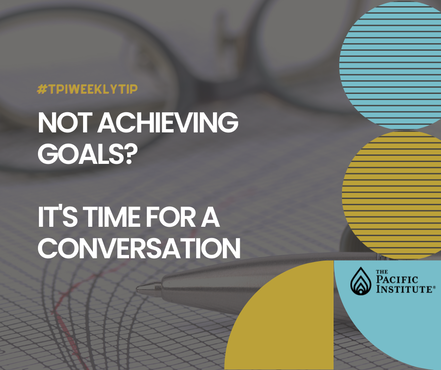|
This week, we address the situation where a team member is not achieving their goals at all. There are three questions, for your review, that provide context and a plan forward for your meeting with this team member.
2 – What has this team member accomplished?
While we have established that they have not achieved their goals, the question of what they have achieved helps you to look at where they have been spending their time. Have they been putting in an honest effort, or have they been phoning it in? If they are putting in an honest effort, then you want to look at where they have been successful and how can you coach them to increase the frequency of that success. If they have the right attitude, but not the right skills, it leads you to Question 3 below. If they have been phoning it in, and not putting forth the effort you would expect, then a performance plan needs to be established. Also, be honest. Did it look this way in the first 90 days? As a leader, this is how we take accountability for our team members’ success. 3 – Do they fit better in another spot within the organisation? This is a serious question. It’s not one that should be used to pass on a poor performer to another department because you are not willing to make the tough decision. If your team member has been with the organisation for a while, have they been successful in other positions? Did this person get promoted too fast? Were they set up for success? This past success possibility means you want to have an honest conversation with them. Perhaps this position is not right for them, and another spot would be better for them and the organisation. If they do not seem to have had success in the past, perhaps you received them on your team because others did not make that tough decision. In that case, it is time to have the tough conversation. It is never easy to have the tough conversations with team members who are not performing. Using the above three questions, to set the context for your conversation, is a good start. As you work to Nurture Growth, this becomes a learning opportunity for your team member, either for next time inside the organisation or outside. We have all heard about PTSD – Post-Traumatic Stress Disorder – and the impact this has on individuals for months, or even years, after the distressful event. There are two other possible outcomes.
The Pacific Institute’s cultural improvement initiatives focus on the nuances needed to help lead a team and culture to better performance by following the model of Connect the Dots, Energize Action and Nurture Growth.
Today’s focus is on the concept of Relatedness. When leaders Energise Action and hold people accountable for their individual and collective performance through clear objectives, effective feedback and coaching they create a strong culture of interdependence and cooperation which leads to increased Relatedness.
|
Copyright © 1971-2021 The Pacific Institute®, LLC. All rights reserved. Privacy Policy | Terms & Conditions
Site powered by Digital Dorado

